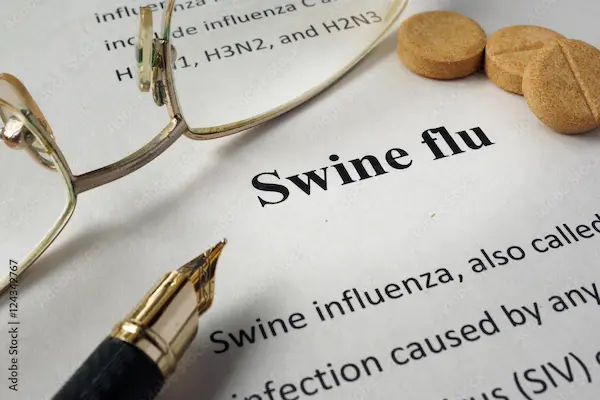Ways To Protect From Swine Flu
Learn about effective ways to protect yourself from swine flu (H1N1). Discover key prevention methods, including vaccination, hand hygiene, and recognizing symptoms to stay healthy and safe.

Written by Dr. Dhankecha Mayank Dineshbhai
Reviewed by Dr. M L Ezhilarasan MBBS
Last updated on 13th Jan, 2026

Introduction
Remember the global concern around swine flu? While it's no longer a pandemic, the H1N1 virus is now a regular strain of seasonal flu that circulates every year. This means the threat hasn't vanished; it's simply become a part of our annual flu season. For vulnerable individuals, catching H1N1 can still lead to severe complications. The good news is that protecting yourself from swine flu is highly achievable with a combination of modern medicine and smart hygiene practices. This article will guide you through ten effective, evidence-based strategies to shield yourself and your loved ones from the H1N1 virus. We'll cover everything from the crucial role of vaccination to daily habits that can significantly reduce your risk of infection and spread.
What exactly is Swine Flu (H1N1)?
Swine flu, originally known for infecting pigs, made a significant jump to humans in 2009, causing a worldwide pandemic. The specific strain responsible was labeled Influenza A (H1N1)pdm09. After the pandemic ended, this virus did not disappear. Instead, it began circulating as a seasonal flu virus, appearing in flu seasons alongside other strains. So, when we talk about swine flu today, we are typically referring to this H1N1 strain that now causes illness in people annually.
Origins and How It Differs from Seasonal Flu
The key difference in 2009 was that H1N1 was a novel virus to which most people under the age of 60 had no immunity. This led to its rapid spread. Today, while it's a "seasonal flu," it can sometimes behave differently than other strains. It has been known to affect younger adults and children more severely than some other flu viruses, making prevention of H1N1 particularly important for these age groups, even if they are otherwise healthy.
How Swine Flu Spreads: Knowing Your Enemy
Understanding how the virus transmits is the first step to stopping it. H1N1 is a respiratory illness, and its spread mirrors that of the common cold and seasonal flu.
Primary Modes of Transmission
The virus primarily spreads through tiny droplets released when an infected person coughs, sneezes, or talks. You can inhale these droplets directly, or you can become infected by touching a surface or object (like a doorknob, keyboard, or phone) that has the virus on it and then touching your own mouth, nose, or possibly your eyes. This makes contagion prevention a matter of blocking both airborne and contact routes.
How Long is Someone Contagious?
An infected person can spread the virus to others from about one day before symptoms develop and up to 5-7 days after becoming sick. This is a critical point because it means people can be contagious before they even know they are ill, underscoring the importance of constant preventive habits.
Consult Top Specialists
Top 10 Strategies to Shield Yourself from H1N1
1. Get Vaccinated: Your First Line of Defense
The annual flu vaccine is the single most effective way to prevent influenza illness and its complications. Modern seasonal flu vaccines are formulated to protect against the H1N1 virus, along with several other strains. Vaccination not only reduces your risk of getting sick but also lessens the severity of illness if you do catch the flu and minimizes the chance of you spreading it to others.
Who Should Get the Flu Shot?
The CDC recommends that everyone 6 months of age and older get a flu vaccine every season, with rare exceptions. It is especially crucial for high-risk groups, including pregnant women, young children, people over 65, and those with chronic health conditions like asthma, diabetes, or heart disease.
2. Master the Art of Hand Hygiene
Washing your hands frequently with soap and water for at least 20 seconds is a simple yet powerful defense. Scrub the backs of your hands, between your fingers, and under your nails. If soap and water aren't available, use an alcohol-based hand sanitizer with at least 60% alcohol. This habit is one of the best tips to avoid the H1N1 virus.
3. Practice Respiratory Etiquette
Always cover your mouth and nose with a tissue when you cough or sneeze, and immediately dispose of the tissue. If you don’t have a tissue, cough or sneeze into your upper sleeve or elbow, never your hands. This contains the droplets and prevents them from contaminating surfaces or becoming airborne.
4. Avoid Touching Your Face
Your eyes, nose, and mouth are direct entry points for germs. The virus on your hands can only infect you if it reaches these mucous membranes. Making a conscious effort to keep your hands away from your face can dramatically cut your risk of infection.
5. Maintain Safe Social Distancing
During peak flu season, try to avoid close contact with people who are sick. If you are sick, stay home to keep your germs to yourself. When community spread is high, maintaining a bit of extra personal space in public can help you avoid inhaling infected droplets.
6. Keep Your Environment Clean
Regularly disinfect frequently touched surfaces at home, work, and school. This includes countertops, light switches, doorknobs, refrigerator handles, and electronic devices. The H1N1 virus can survive on surfaces for several hours, so this practice is key to breaking the chain of transmission.
7. Boost Your Immune System Naturally
While no supplement is a magic bullet, a well-functioning immune system is better equipped to fight off infections. Ensure you get adequate sleep, as sleep deprivation can weaken your immune response.
8. Stay Hydrated and Eat a Balanced Diet
Proper hydration keeps your respiratory system moist and more resilient. A diet rich in fruits, vegetables, and whole grains provides essential vitamins and antioxidants that support overall immune health.
9. Get Sufficient Sleep and Manage Stress
Chronic stress and lack of sleep elevate cortisol levels, which can suppress your immune system. Prioritizing 7-9 hours of quality sleep and engaging in stress-reducing activities like meditation, walking, or yoga can help keep your defenses strong.
10. Be Smart About Travel and Public Gatherings
If there's a significant swine flu outbreak in your area or your destination, consider the risks of non-essential travel or attending large, crowded events. If you must go, be extra vigilant about hygiene and avoid contact with anyone showing symptoms.
Recognizing Swine Flu Symptoms
The symptoms of H1N1 are similar to seasonal flu and include:
- Fever and chills (not everyone with flu will have a fever)
- Cough
- Sore throat
- Runny or stuffy nose
- Body aches
- Headache
- Fatigue
Some may experience diarrhea and vomiting (more common in children).
When to Seek Medical Attention Immediately
Seek emergency medical care if you or a loved one experiences:
- Difficulty breathing or shortness of breath
- Persistent pain or pressure in the chest or abdomen
- Sudden dizziness or confusion
- Severe or persistent vomiting
- Flu-like symptoms that improve but then return with a worse fever and cough
If you or someone in a high-risk group develops flu symptoms, it is crucial to consult a doctor promptly. For quick evaluation, you can consult a doctor online with Apollo24|7 to determine if antiviral treatment is necessary.
What to Do If You Get Sick
Home Care Tips for Recovery
If you get sick, stay home and rest. Drink plenty of fluids like water, broth, and electrolyte solutions to prevent dehydration. Use over-the-counter medications to manage fever and aches, but avoid giving aspirin to children or teenagers.
Antiviral Medications: Are They Right for You?
Antiviral drugs like oseltamivir (Tamiflu) or zanamivir (Relenza) are prescription medicines that can treat flu illness. They are not antibiotics and work best when started within 48 hours of getting sick. They can lessen symptoms and shorten the time you are sick by 1-2 days. They are often recommended for people with severe illness or those at high risk of complications. A doctor can prescribe these if needed.
Key Takeaways: Your Swine Flu Prevention Cheat Sheet
- Vaccinate Annually: The flu shot is your best defense against H1N1 and other strains.
- Wash Hands Religiously: Use soap and water or alcohol-based sanitizer throughout the day.
- Cover Coughs and Sneezes: Use your elbow or a tissue, not your hands.
- Don't Touch Your Face: This prevents germs on your hands from entering your body.
- Disinfect Surfaces: Regularly clean high-touch areas at home and work.
- Stay Home When Sick: Protect others by avoiding work, school, and public places.
- Listen to Your Body: Know the emergency warning signs and seek medical help immediately if they appear.
Alt Text: Infographic comparing severity and symptoms of common cold, seasonal flu, and H1N1 swine flu.
Conclusion
Protecting yourself from swine flu (H1N1) is not about panic, but about consistent and intelligent prevention. By incorporating these ten strategies—led by the powerful one-two punch of annual vaccination and meticulous hand hygiene—you can dramatically reduce your risk of infection and contribute to a healthier community. Remember, these habits are effective not just against H1N1 but against a wide range of common viruses, making them wise practices for year-round health. Stay informed, stay vigilant, and don't hesitate to seek professional medical advice if you have concerns about your symptoms. Your health is in your hands—literally.
Consult Top Specialists
Consult Top Specialists

Dr Aakash Andgi
General Physician/ Internal Medicine Specialist
9 Years • MBBS MD
Bengaluru
Apollo Clinic, JP nagar, Bengaluru

Dr. Zulkarnain
General Physician
2 Years • MBBS, PGDM, FFM
Bengaluru
PRESTIGE SHANTHINIKETAN - SOCIETY CLINIC, Bengaluru

Dr. Sudhashree R
General Physician/ Internal Medicine Specialist
13 Years • MBBS, MRCEM
Bengaluru
Apollo Clinic, JP nagar, Bengaluru

Dr. Smitha Nagaraj
General Physician/ Internal Medicine Specialist
15 Years • MBBS, Diploma in Family Medicine
Bengaluru
Apollo Medical Center, Marathahalli, Bengaluru

Dr. Divyashree K
General Physician/ Internal Medicine Specialist
5 Years • MBBS
Bengaluru
Apollo Clinic, JP nagar, Bengaluru
Consult Top Specialists

Dr Aakash Andgi
General Physician/ Internal Medicine Specialist
9 Years • MBBS MD
Bengaluru
Apollo Clinic, JP nagar, Bengaluru

Dr. Zulkarnain
General Physician
2 Years • MBBS, PGDM, FFM
Bengaluru
PRESTIGE SHANTHINIKETAN - SOCIETY CLINIC, Bengaluru

Dr. Sudhashree R
General Physician/ Internal Medicine Specialist
13 Years • MBBS, MRCEM
Bengaluru
Apollo Clinic, JP nagar, Bengaluru

Dr. Smitha Nagaraj
General Physician/ Internal Medicine Specialist
15 Years • MBBS, Diploma in Family Medicine
Bengaluru
Apollo Medical Center, Marathahalli, Bengaluru

Dr. Divyashree K
General Physician/ Internal Medicine Specialist
5 Years • MBBS
Bengaluru
Apollo Clinic, JP nagar, Bengaluru
More articles from H1N1 flu swine flu
Frequently Asked Questions
Can I get swine flu from eating pork?
No. The H1N1 virus is not transmitted by eating properly handled and cooked pork. The virus spreads from person to person through respiratory droplets, not through food.
How long does the swine flu last?
For most healthy people, the acute illness lasts about 3-7 days, though a cough and feeling tired can persist for two weeks or more.
Is the H1N1 swine flu vaccine safe?
Yes. The seasonal flu vaccine, which includes protection against H1N1, has a very long and established safety record. Millions of people receive it safely every year. The benefits of protection far outweigh the minimal risks.
What is the difference between swine flu and COVID-19?
They are caused by different viruses. While they share some similar symptoms, COVID-19 is caused by the novel coronavirus (SARS-CoV-2) and has been observed to spread more easily and cause more serious illnesses in some people. Some symptoms, like loss of taste or smell, are more specific to COVID-19.
Are there any specific home remedies for swine flu symptoms?
While no remedy can cure the flu, supportive care can ease symptoms. This includes resting, staying hydrated with warm broths and herbal teas, using a humidifier to ease congestion, and gargling with salt water for a sore throat. These should complement, not replace, medical advice.


.webp)
; Symptoms, Prevention, and Expert Tips to Stay Safe.webp)